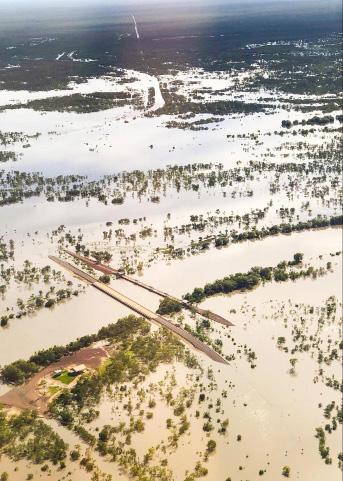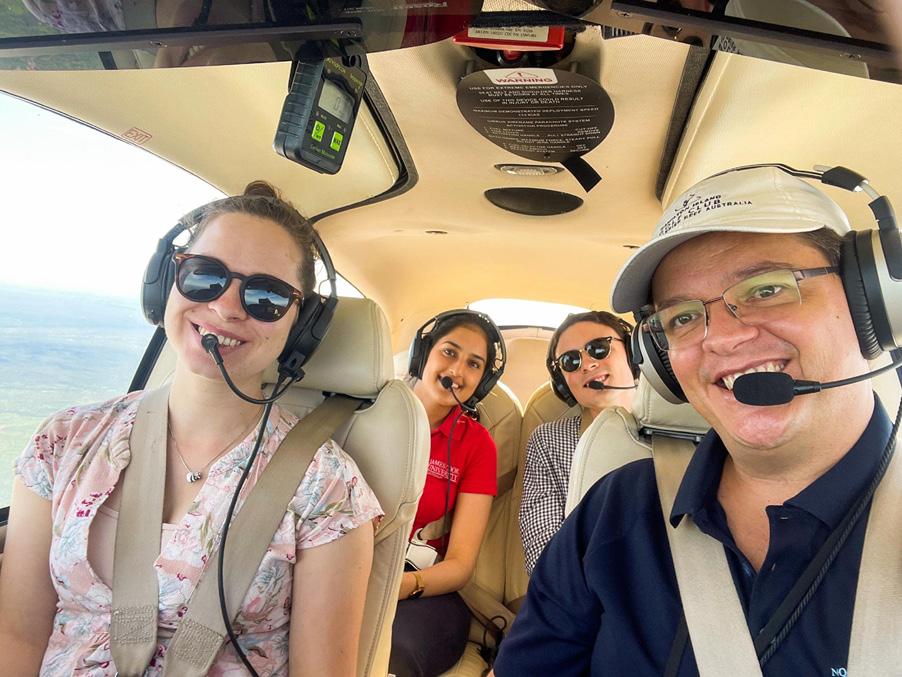
5 minute read
A Call to Aid in Karumba
Tianna Graham - Communications and Engagement Coordinator, James Cook University
Tropical Cyclone Imogen crossed the western Gulf of Queensland, near Karumba, late on Sunday, January 3, 2021. The aftermath of the storm left the remote community completely isolated as flood waters cut off main roads. The only way in or out was by air.
Advertisement
Dr Michael Clements, a Townsville-based GP who regularly runs outreach clinics around the Cape, was preparing to fly in and aid the community’s recovery. Knowing medical staff would be understaffed and under-resourced, he put out the call to final-year JCU students to see if they could lend a hand.
Hannah Kahn and Harjyot Gill were among the three students who jumped at the chance to help the people of Karumba. This is their story. A privilege to help: Hannah Kahn
Getting to go to Karumba was an absolute privilege. When I saw the email saying there was an opportunity to go, I only had to read a few key points before I was sold. Flying in a four-seater aircraft? Helping a community recover from a natural disaster? Practising medicine in a low-resource environment? I thought, this is it, this is what I want to do! I’ve been grateful for the opportunity ever since.
Flying into Karumba, you could see the extensive flooding. As it was a lower category cyclone, only a few trees were down, but what I found most striking was the degree of inundation. While the town itself was not flooded, the entire surrounding area was, which was immediately apparent from the air. Seeing the Norman River burst its banks, well and truly cutting off the road, was also impressive to behold.
There are many health implications that can stem from a natural disaster such as this. Often, there are increases in the transmission of arthropod-borne illnesses, skin infections, and multisystem diseases such as melioidosis.
We did see some structural damage to housing within the community, with older properties bearing the brunt of the damage. There was an enormous gum
Pictured: Flying over the flooded Norman River outside of Karumba. Roads were completely cut off to the community after rain from Tropical Cyclone Imogen inundated the area.
tree down in one elderly couple’s yard, and of course their physical condition prevented them from being able to do anything about it.
Given that most of the community members have lived in North Queensland for most of their lives, they are a resilient bunch.
With that said, it was clear how much strain the local nurse-practitioner felt. Her exhaustion was palpable. In addition to people physically affected by the floods, patients with preexisting mental health concerns were also being admitted, mentally drained by the damage to and loss of their properties.
When we were there we had a number of opportunities to assist Dr Clements and the nurse practitioner. There was a patient I helped with who had presented with a venous stasis ulcer. Given the scope of her practice, the nurse practitioner was uncomfortable managing this patient in the community. Under normal circumstances, the patient would have been sent on an aeromedical retrieval flight to Mount Isa. However, given it wasn’t an urgent case, flying the patient out at that time wasn’t really justifiable. This gave me first-hand experience in how clinical decision making is affected by context, both in terms of physical and human resources.
Most of the cases we were able to help with were fairly common and not directly linked to the cyclone. However, the opportunity to relieve some pressure from the local nurse and keep things moving efficiently for Dr Clements was amazing.
We were there and back in a flash. Getting to go on this adventure, however, was the opportunity of a lifetime. I was privileged to play a meaningful role in the acute healthcare of this under-strain community. I may have received a few mozzie bites along the way, but I also gained confidence in my ability to help out in a pressure situation. I also learnt many valuable lessons from our enthusiastic mentor, Dr Michael Clements. I would go again in a heartbeat!

JCU Medicine students Harjyot Gill, Hannah Kahn and Tahne Lahiff with Dr Michael Clements on outreach in Karumba after Tropical Cyclone Imogen.

Dr Michael Clements (far right) flying JCU Medicine students Hannah Kahn, Hajyot Gill and Tahne Lahiff from Townsville to Karumba to assist the community after Tropical Cyclone Imogen.
Supporting the community: Harjyot Gill
When I got the call to come help the community of Karumba recover from Cyclone Imogen, I knew this was my opportunity to give back. From my past experiences in natural disasters, most notably Cyclone Yasi, I understood how uplifting it can be to have the help and support of others during such an arduous time. From Dr Clements’ plane, seeing the aftermath of the cyclone, my heart ached for the community of Karumba.
Our day started as soon as we arrived in Karumba at 9.30am. After a quick introduction to the nurse practitioner and registered nurse, we were given our own consulting rooms and patients to see. During my day, I saw a wide variety of patients. This included an elderly man with an infected insect bite, a mother with a wrist fracture, a young man dealing with mental health issues, and an elderly woman suffering from a severe chest infection. Every patient shared their story, and some consults ended in tears. In these vulnerable moments, I was continually reminded of the privilege of being a doctor, and how lucky I was to be able to offer help and solace in such a bewildering time.
This experience also highlighted the unique challenges of rural and remote medicine, as Karumba did not have access to advanced diagnostic testing. On the whole, patients also seemed to prefer treatment in the community.
The next day, we went out into the community for home visits. This was a great opportunity for us to assess patients in the comfort of their own abodes. In visiting patients at home, we can get a better idea of patient risk, and identify their access to safety amenities and family support.
The overwhelming feeling of being wanted, expected and needed in Karumba was sublime. This truly was the opportunity of a lifetime. I left having learnt invaluable lessons from Dr Clements, and having formed indelible connections with the people of Karumba. My heart goes out to the community of Karumba, and many of their concerns rang true within me. I would like to sincerely thank Dr Clements for this unique opportunity.










